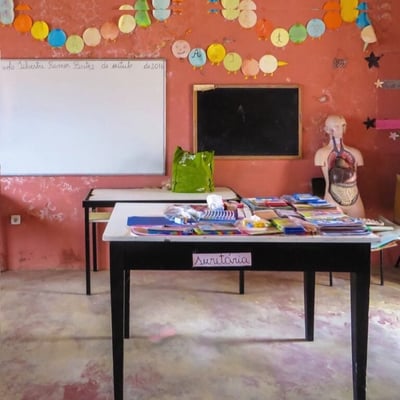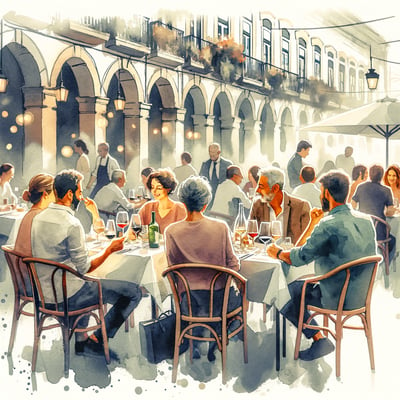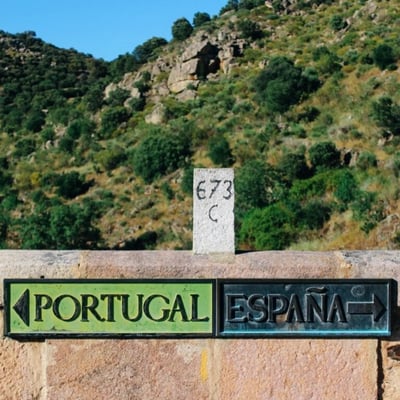1
00:00:03,243 –> 00:00:05,463
Paulo: Há alguma coisa para almoçar?
{{Paulo: Is there anything for lunch?}}
2
00:00:06,030 –> 00:00:10,089
Rute: Sim, ainda há um resto de lasanha que sobrou do jantar.
{{Rute: Yes, there is still [the] rest of [the] lasagna left over from dinner.}}
3
00:00:10,646 –> 00:00:15,603
Paulo: Ando a comer lasanha há dois dias… Apetece-me uma coisa mais leve.
{{Paulo: I’ve been eating lasagna for two days… I feel like something lighter.}}
4
00:00:16,056 –> 00:00:17,839
Rute: Podemos fazer uma salada.
{{Rute: We can make a salad.}}
5
00:00:18,436 –> 00:00:23,884
Paulo: Uma salada é boa ideia. É preciso ir ao supermercado comprar alguma coisa?
{{Paulo: A salad is a good idea. Do I have to go to the supermarket to buy something?}}
6
00:00:24,457 –> 00:00:29,357
Rute: Temos de ir às compras mas, para já, acho que não há necessidade.
{{Rute: We have to go shopping, but for now I think there is no need.}}
7
00:00:29,824 –> 00:00:38,159
Rute: Vou confirmar se temos tudo para a salada. Há grão, atum, tomate, queijo fresco, espinafres…
{{Rute: I’ll check if we have everything for the salad. There’s chickpea[s], tuna, tomato, cottage cheese, spinach…}}
8
00:00:38,585 –> 00:00:39,561
Paulo: Há cenoura?
{{Paulo: Are there carrots?}}
9
00:00:39,922 –> 00:00:40,389
Rute: Sim.
{{Rute: Yes.}}
10
00:00:40,876 –> 00:00:41,503
Paulo: E massa?
{{Paulo: And pasta?}}
11
00:00:41,873 –> 00:00:42,510
Rute: Não há.
{{Rute: There isn’t any.}}
12
00:00:42,871 –> 00:00:46,385
Paulo: Não há problema. Com isso já fazemos uma boa salada!
{{Paulo: No problem. With that we can already make a good salad!}}
13
00:00:46,944 –> 00:00:51,543
Rute: Sim, vou começar. Queres fazer a lista de compras, entretanto?
{{Rute: Yes, I’ll start. Do you want to make the shopping list in the meantime?}}
14
00:00:52,035 –> 00:00:58,586
Paulo: Boa ideia! Vou pôr – fruta, legumes, iogurtes, queijo…
{{Paulo: Good idea! I’ll put – fruit, vegetables, yogurts, cheese…}}
15
00:00:59,036 –> 00:01:03,458
Rute: Arroz, massa, carne, peixe…
{{Rute: Rice, pasta, meat, fish…}}
16
00:01:03,872 –> 00:01:04,706
Paulo: Ainda há leite?
{{Paulo: Is there any milk?}}
17
00:01:05,124 –> 00:01:07,712
Rute: Sim. E pão, ainda há?
{{Rute: Yes. And bread, is there any left?}}
18
00:01:08,200 –> 00:01:10,767
Paulo: Vou ver… já não há.
{{Paulo: I’ll check… there isn’t any.}}
19
00:01:11,276 –> 00:01:14,712
Rute: Bolachas? Não, é melhor não…
{{Rute: Cookies? No, it’s better not [to]…}}
20
00:01:15,116 –> 00:01:15,877
Paulo: Gelatina?
{{Paulo: Gelatin?}}
21
00:01:16,389 –> 00:01:17,601
Rute: Bem lembrado!
{{Rute: Good memory! (“Well remembered!”)}}
22
00:01:18,043 –> 00:01:20,105
Paulo: Precisamos de pasta de dentes?
{{Paulo: Do we need toothpaste?}}
23
00:01:20,441 –> 00:01:22,838
Rute: Sim, a nossa está a acabar.
{{Rute: Yes, ours is running out.}}
24
00:01:23,283 –> 00:01:24,993
Paulo: Há algum papel higiénico?
{{Paulo: Is there any toilet paper?}}
25
00:01:25,405 –> 00:01:27,038
Rute: Sim, não é preciso.
{{Rute: Yes, it’s not necessary.}}
26
00:01:27,611 –> 00:01:29,350
Paulo: Gel de duche e champô?
{{Paulo: Shower gel and shampoo?}}
27
00:01:29,775 –> 00:01:30,507
Rute: Aponta.
{{Rute: Write that down.}}
28
00:01:31,090 –> 00:01:32,426
Paulo: Produtos de limpeza?
{{Paulo: Cleaning products?}}
29
00:01:32,957 –> 00:01:34,972
Rute: Precisamos de limpa vidros.
{{Rute: We need glass cleaner.}}
30
00:01:35,269 –> 00:01:36,973
Paulo: E produto para lavar o chão?
{{Paulo: And a product to wash the floor?}}
31
00:01:37,433 –> 00:01:38,241
Rute: Ainda há.
{{Rute: There is still some.}}
32
00:01:38,621 –> 00:01:40,148
Paulo: Detergente para a roupa?
{{Paulo: Laundry detergent?}}
33
00:01:40,551 –> 00:01:44,471
Rute: Ainda há, mas não temos para a loiça. Aponta aí.
{{Rute: There is still some, but we don’t have the one for the dishes. Write it down.}}
34
00:01:44,922 –> 00:01:48,364
Paulo: Já está. E amaciador há?
{{Paulo: Done. And is there [fabric] softener?}}
35
00:01:48,867 –> 00:01:50,713
Rute: Não. Também é preciso.
{{Rute: No. It’s also needed.}}
36
00:01:51,201 –> 00:01:52,559
Paulo: Acho que está tudo.
{{Paulo: I think that’s everything.}}
37
00:01:53,004 –> 00:01:56,265
Rute: Também acho que sim. Vamos almoçar e já confirmamos.
{{Rute: I think so too. Let’s have lunch and we’ll confirm after.}}
 We respect your privacy and have a ZERO TOLERANCE for spam.
We respect your privacy and have a ZERO TOLERANCE for spam.
















O único casal do mundo que não precisa de papel higiénico !!
E essa lista bizarra … onde estão os itens essenciais …… o vinho, por exemplo………
Why is it preciso ir and not preciso de ir please? I thought ‘de’ always comes after the ‘precisar’. Thank you.
In European Portuguese, we generally add ‘de’ after ‘precisar’ when the word is used as a verb. In this case, you have “é preciso” = “it is necessary”. So, it’s being used as an adjective and that rule of thumb doesn’t apply 🙂
Great, thank you. I’ve learned something new this evening
Olá, se ‘apetecer’ é o verb, porque dizemos ‘apetece-me’ em vez de ‘apeteco’?
Olá, Michael. O verbo apetecer é geralmente usado como um verbo impessoal. Por isso, em frases com este verbo, em vez de nós sermos o sujeito, nós somos o complemento indireto (indirect object), e o complemento direto (direct object) é aquilo que nos apetece.
Por exemplo:
1) “Apetece-me um croissant”. Complemento direto: um croissant. Complemento indireto: -me (eu).
É por isso que não dizemos “Eu apeteço”, porque nesse caso estamos a dizer que nós é que somos a coisa apetecível! 🙂
Yes, you can run out of toothpaste. Toothpaste is running out , sounds weird.
Para que é utilizada a gelatina neste caso? É para fazer uma gelatina doce (jelly in uk) ou outro prato mais savory. Nao há indicação no diálogo.
The translation for the exercise
I shall watch that movie one day
was given as
Ainda hei de ver esse filme
Is this acceptable as well?
Hei de ver esse filme um dia
Can you explain why havia is used in the first example and houve is used in the second? These come from the lessons I’ve recently been practicing.
There was no way of speaking to him
Não havia maneira de falar com ele
There was a dramatic increase in patients
Houve um aumento dramático de pacientes
Olá!
– Não havia maneira de falar com ele (There was no way of speaking to him) -> In this case, the imperfect is used because it’s as if the speaker is going back to the time of the action. It’s almost like when we try to recreate a past situation on our minds and visualize it in “real time” within that past setting. It’s why this is a commonly used tense in narrations. The simple past could also be used here, in which case the action would be regarded with a clearly distant outlook.
– Houve um aumento dramático de pacientes -> In this case, only the simple past is applicable, because we’re presumably talking about a specific time-limited occurrence in the past. Same reason why we say, for example, “Houve uma explosão” and not “Havia uma explosão” 🙂
So, although not correct, how would “Havia uma explosão” be translated to English compared to “Houve uma explosão”? Or is the first form nonsensical?
I guess it could be translated like the imperfect usually is, but it doesn’t make much sense in Portuguese.
– There was an explosion / There used to be an explosion / There would be an explosion
What confused me in my original question was that both of these phrases used “there was” in the English version. The fact that these translations are actually different tenses in English doesn’t really jump out to me. I don’t think English speakers in general aren’t as aware of the large variety of tenses that are commonplace in most languages.
I perfectly understand that! Many times, there’s no exact correspondence between Portuguese and English tenses and no way to distinguish them just off of a translation. Just one of several ways Portuguese can get very tricky.
Why ” e preciso” is used to indicate something is needed? After all preciso is the fist person singular for present tense. Would it not be more correct to say “e precisado”, i.e. literally something is needed (passive voice) ?
Good question 🙂 ‘Preciso’ is not only a present tense conjugation, but also the irregular past participle form of the verb precisar. We use this irregular form with the auxiliary verb ser (e.g. in the passive voice) and we use the regular past participle ‘precisado’ with the auxiliary verb ter (e.g. for compound tenses such as the past perfect – “tinha precisado”). This is true for all verbs with two past participles, such as the verbs matar (matado/morto) or soltar (soltado/solto).
Thanks very much. It was good to know this even before coming to the passive speech part. Somewhat complicated set of rule though.. All the best..